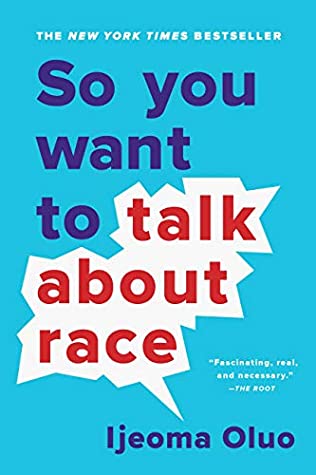So You Want to Talk About Race

So You Want to Talk About Race, written by Ijeoma Oluo, offers knowledge and tools to help people engage in conversations about race. Oluo teaches about racism and pushes people to view it from a systemic lens, defining it as "a prejudice against someone based on race, when those prejudices are reinforced by systems of power" (page 27). She also delves into related topics, ranging from intersectionality, cultural appropriation, microaggressions, model minority myths and others. Many chapters provide details on how to talk about race in ways that don't shy away from confronting systemic issues and prejudice.

Ijeoma Oluo is an interracial Black woman, who centers her experiences throughout the book. This is significant, since listening to the experiences of Black people and other people of colour is necessary for white people to better understand how our actions perpetuate racism and racist systems. Writing to white people specifically, she says:
You are racist because you were born and bred in a racist, white supremacist society. White Supremacy is, as I've said earlier, insidious by design. The racism required to uphold White Supremacy is woven into every area of our lives. There is no way you can inherit white privilege from birth, learn racist white supremacist history in schools, consume racist and white supremacist movies and films, work in a racist and white supremacist workforce, and vote for racist and white supremacist governments and not be racist (page 218).
She emphasizes that to be a better person, introspection is necessary, which comes from listening when confronted with one's own racism and doing the work to be better.
Examples in the book are mainly situated in America, but the general topics are applicable and relevant in a Canadian context. Oluo refers to a few Canadian examples of racism, such as government inaction towards missing and murdered Indigenous women and girls or the carding of Black people by police. (For more detailed information about anti-Black racism in Canada, I would recommend Policing Black Lives by Robyn Maynard and The Skin We're In by Desmond Cole.) Oluo does not discuss settler colonialism or Indigenous rights in much detail, so I would recommend supplementing her writing with texts like Indigenous Writes by Chelsea Vowel or Seven Fallen Feathers by Tanya Talaga. However, for readers who are looking for a better understanding of racism, how it affects people of colour, and how to talk about it, So You Want to Talk About Race is an excellent place to start.
